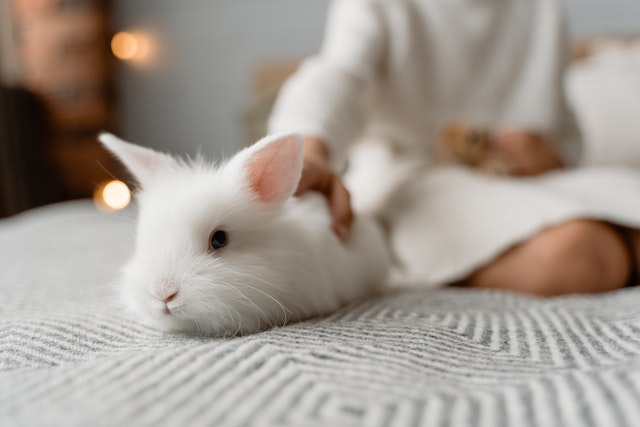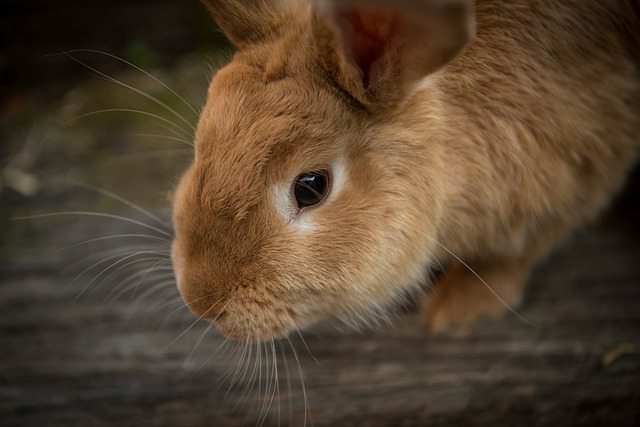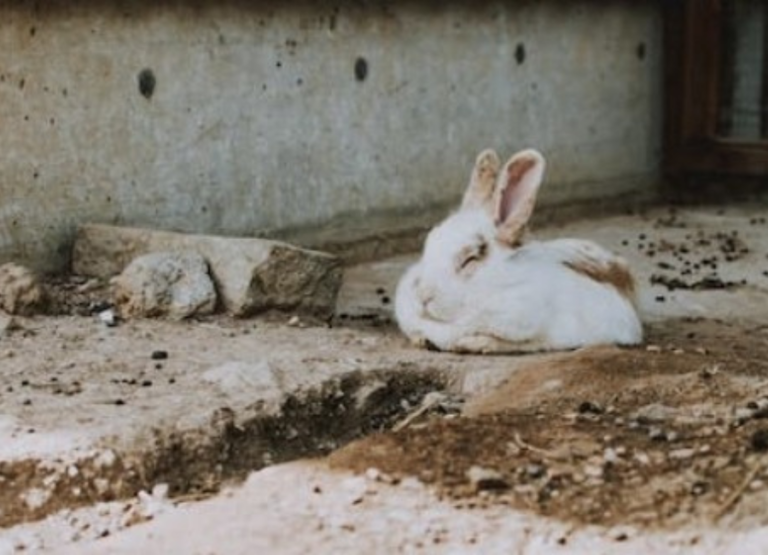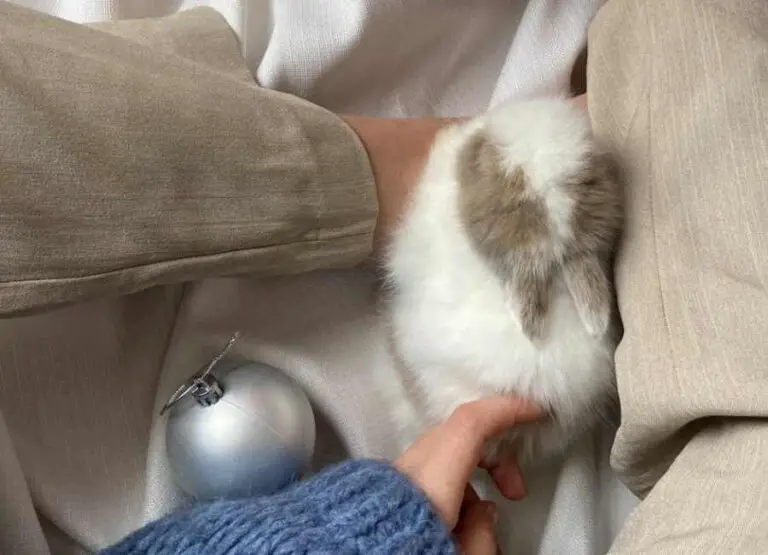12 Reasons For a Rabbit Acting Weird With Tips

Is your rabbit acting weird? Let’s find out why together… Have you ever noticed your furry friend hopping around like they’ve had one too many carrots?
Well, you’re in luck because today we’re diving into the world of peculiar rabbit behavior.
Buckle up, because we’re about to uncover the reasons behind your bunny’s strange antics.
Why is My Rabbit Acting Weird?
Your rabbit might be acting weird due to changes in the environment, stress, pest attacks, hormonal fluctuations, depression, changes in diet, and illnesses.
Check for any changes in their environment, diet, or social interactions that might be causing stress.
If the odd behavior persists, consider consulting a veterinarian to rule out any health issues.
Let’s break it down further…
Reasons Why a Rabbit Might Be Acting Weird
The following are some common reasons why your rabbit might be acting weird:
1. Illness or Pain
If a rabbit is acting weird, it could be a sign of illness or pain. Rabbits are prey animals, so they often hide signs of illness or pain until they are very sick.
If you notice any of the following signs, it is important to take your rabbit to a veterinarian:
- Loss of appetite or weight loss
- Lethargy or lack of energy
- Changes in behavior, such as aggression or hiding
- Difficulty breathing or wheezing
- Diarrhea or abnormal droppings
- Excessive grooming or fur loss
- Swelling or lumps
What to do: Take your rabbit to a veterinarian as soon as possible for a thorough examination and appropriate treatment.
It is important to address any underlying health issues to ensure the well-being of your rabbit.
2. Excessive Stress
Excessive stress can also cause a rabbit to act weird. Stress can be caused by various factors, such as changes in the environment, loud noises, or the presence of predators. Signs of stress in rabbits include:
- Aggression or biting
- Hiding or excessive burrowing
- Overgrooming or fur pulling
- Loss of appetite
- Restlessness or pacing
- Frequent thumping of hind legs
What to do: Identify and remove the source of stress, if possible. Provide a calm and secure environment for your rabbit.
Ensure that your rabbit has a safe hiding place and plenty of opportunities for mental and physical stimulation. If the stress persists or worsens, consult with a veterinarian or an animal behaviorist for further guidance.
3. Fear
Rabbits can exhibit weird behavior when they are afraid. Fear can be triggered by various factors, such as loud noises, sudden movements, or unfamiliar people or animals.
Signs of fear in rabbits include:
- Freezing or immobility
- Running away or hiding
- Thumping of hind legs
- Growling or hissing
- Aggression or biting
What to do: Create a calm and safe environment for your rabbit. Avoid sudden movements or loud noises that may startle your rabbit. Give your rabbit space and time to feel secure.
Gradually introduce new people or animals to your rabbit in a controlled and positive manner. If your rabbit’s fear persists or worsens, consult with a veterinarian or an animal behaviorist for further guidance.
4. Boredom
Boredom can also cause a rabbit to act weird. Rabbits are intelligent and active animals that require mental and physical stimulation. Signs of boredom in rabbits include:
- Destructive behavior, such as chewing on furniture or wires
- Excessive digging or burrowing
- Overgrooming or fur pulling
- Restlessness or pacing
- Loss of appetite
What to do: Provide your rabbit with plenty of opportunities for mental and physical stimulation. Ensure that your rabbit has a spacious and enriching environment with toys, tunnels, and hiding places.
Offer a variety of safe and appropriate chew toys to satisfy your rabbit’s natural chewing behavior. Consider providing your rabbit with the company of another rabbit, as rabbits are social animals. Regularly interact and play with your rabbit to keep them engaged and entertained.
5. Hormonal Changes
Rabbits, especially unneutered males and unspayed females, can experience hormonal changes that can affect their behavior.
These changes can include aggression, territorial marking, and mounting behavior.
If you suspect hormonal changes are causing your rabbit to act weird, it is recommended to consult with a veterinarian who specializes in rabbit care.
They can provide guidance on whether spaying or neutering your rabbit is appropriate and can help alleviate the hormonal changes.
6. Anxiety
Rabbits can be sensitive animals and may become anxious in certain situations.
Common triggers for anxiety in rabbits include loud noises, sudden movements, unfamiliar environments, or changes in routine.
If your rabbit is acting weird due to anxiety, it is important to create a calm and secure environment for them.
Provide a quiet and comfortable space for your rabbit to retreat to, and avoid exposing them to stressful situations or depression.
Additionally, spending time with your rabbit, providing gentle reassurance, and using positive reinforcement techniques can help reduce anxiety.
7. Overheating
Rabbits are prone to overheating, especially in hot weather or if they are kept in an environment with poor ventilation.
Signs of overheating in rabbits include excessive panting, lethargy, loss of appetite, and seeking cool surfaces. If you suspect your rabbit is overheating, it is important to take immediate action to cool them down.
Move your rabbit to a cool and shaded area, provide access to fresh water, and use a damp towel or misting spray to help lower their body temperature.
If the symptoms persist or worsen, it is recommended to seek veterinary assistance.
8. Presence of Mites
Mites are tiny parasites that can infest a rabbit’s fur and skin, causing discomfort and irritation.
Common signs of mite infestation in rabbits include excessive scratching, hair loss, redness or inflammation of the skin, and the presence of small white specks (mites) on the fur.
If you suspect your rabbit has mites, it is important to consult with a veterinarian who can diagnose and provide appropriate treatment.
Treatment typically involves topical or oral medications to eliminate the mites and relieve the symptoms. Additionally, it is important to thoroughly clean and disinfect your rabbit’s living area to prevent re-infestation.
9. Sudden Changes in Their Diet
Rabbits are known for their sensitive digestive systems, so sudden changes in their diet can cause them to act weird.
Here are some possible reasons for their strange behavior and what you can do:
Possible Reasons:
- Upset stomach: If a rabbit’s diet is suddenly changed, it can lead to an upset stomach, resulting in symptoms like diarrhea, loss of appetite, or lethargy.
- Nutritional imbalance: Rabbits require a specific balance of fiber, hay, fresh vegetables, and pellets in their diet. A sudden change in any of these components can lead to digestive issues.
What to Do:
- Gradual transition: If you need to change your rabbit’s diet, do it gradually over a period of 1-2 weeks. Start by mixing a small amount of the new food with the old food and gradually increase the proportion of the new food.
- Monitor their behavior: Keep an eye on your rabbit’s behavior and look out for any signs of digestive distress. If you notice any unusual symptoms, consult a veterinarian for guidance.
- Provide hay and water: Make sure your rabbit has access to fresh hay and water at all times. Hay is essential for their digestive health and helps prevent gastrointestinal issues.
10. Hunger
If a rabbit is acting weird, it could be due to hunger. Here’s what you can do:
Possible Reasons:
- Insufficient food: If a rabbit is not getting enough food, they may exhibit signs of hunger, such as excessive chewing, digging, or searching for food.
- Inadequate diet: Even if a rabbit is eating enough, an imbalanced or poor-quality diet can leave them feeling unsatisfied and constantly searching for more food.
What to Do:
- Provide a balanced diet: Ensure that your rabbit’s diet includes a proper balance of hay, fresh vegetables, and pellets. Consult a veterinarian for specific dietary recommendations based on your rabbit’s age and health.
- Monitor food intake: Keep track of how much your rabbit is eating. If you notice a significant decrease in their food consumption, it’s important to consult a veterinarian to rule out any underlying health issues.
- Offer enrichment: Provide your rabbit with toys, puzzles, or foraging opportunities to keep them mentally stimulated and prevent excessive hunger-related behaviors.
11. Gastrointestinal Problems
Gastrointestinal problems can cause rabbits to act weird. Here are some possible reasons and what you can do:
Possible Reasons:
- Gastrointestinal stasis: This condition occurs when a rabbit’s digestive system slows down or stops working properly. It can be caused by factors such as a lack of fiber, dehydration, stress, or dental problems.
- Gastrointestinal blockage: Rabbits are prone to ingesting foreign objects or excessive fur, which can lead to blockages in their digestive tract.
What to Do:
- Seek veterinary care: If you suspect your rabbit is experiencing gastrointestinal issues, it’s crucial to seek veterinary care as soon as possible. Gastrointestinal stasis and blockages can be serious and potentially life-threatening.
- Follow vet’s recommendations: Your veterinarian may recommend treatments such as fluid therapy, pain medication, gut motility drugs, or surgery, depending on the severity of the condition.
- Promote gut health: To prevent gastrointestinal problems, ensure your rabbit has a high-fiber diet, access to fresh water, and regular exercise. Regular grooming can also help prevent excessive fur ingestion.
12. Presence of Fleas
If a rabbit has fleas, it can cause them to act weird. Here’s what you can do:
Possible Reasons:
- Discomfort: Fleas can cause intense itching and discomfort for rabbits, leading to behaviors like excessive scratching, biting, or restlessness.
- Allergic reactions: Some rabbits may be allergic to flea saliva, which can exacerbate the itching and discomfort.
What to Do:
- Consult a veterinarian: If you suspect your rabbit has fleas, consult a veterinarian for appropriate flea treatment options. It’s important to use flea treatments specifically formulated for rabbits, as some products designed for dogs or cats can be toxic to rabbits.
- Treat the environment: Fleas can infest the rabbit’s environment, so it’s important to thoroughly clean and treat their living area to prevent reinfestation.
- Provide relief: In addition to flea treatment, your veterinarian may recommend soothing measures such as oatmeal baths or topical creams to alleviate itching and discomfort.
Read more about abnormal behaviors in rabbits.
What to Do if Your Rabbit is Acting Weird
If your rabbit is acting weird, there are a few steps you can take. First, observe their behavior closely to identify any specific changes or signs of distress.
Second, check their environment to ensure it is safe, comfortable, and free from any potential hazards.
Third, monitor their food and water intake to ensure they are eating and drinking normally.
Fourth, consider any recent changes in their routine or diet that could be causing the unusual behavior.
Finally, if the unusual behavior persists or worsens, it is advisable to consult a veterinarian for a professional evaluation and guidance.
Frequently Asked Questions
Why is my rabbit suddenly acting weird?
There could be several reasons why your rabbit is behaving strangely. It might be feeling stressed, experiencing a health issue, or reacting to changes in its environment. It’s essential to observe its behavior and consult a veterinarian if the unusual behavior persists.
My rabbit is hiding more than usual. Is this normal?
While rabbits do enjoy hiding, excessive hiding could indicate an underlying issue. It might be feeling unwell, scared, or stressed. Ensure that your rabbit has a safe and comfortable environment, with plenty of hiding spots, and monitor its behavior. If you’re concerned, reach out to a rabbit-savvy veterinarian for advice.
Why is my rabbit suddenly aggressive towards me?
Sudden aggression in rabbits can be a sign of fear, pain, or territorial behavior. It’s crucial to rule out any health problems by consulting a veterinarian. Additionally, evaluate if any changes in your rabbit’s routine, environment, or handling techniques may have triggered the aggression. Patience and positive reinforcement can help in reestablishing trust and reducing aggression.
Is it normal for my rabbit to stop eating or drinking?
A sudden loss of appetite or decrease in water intake is a cause for concern in rabbits. It could indicate dental issues, gastrointestinal problems, or even stress. Monitor your rabbit’s eating and drinking habits closely. If the behavior persists for more than 24 hours, seek immediate veterinary attention.
My rabbit is making unusual sounds. What could it mean?
Unusual sounds from your rabbit could indicate pain, discomfort, or even excitement. Rabbits can make honking, growling, or grunting noises when they are happy or irritated. However, if the sounds are accompanied by other unusual behavior or signs of distress, consult a veterinarian for a thorough evaluation.
Why is my rabbit suddenly chewing on everything?
Rabbits have a natural instinct to chew and keep their teeth healthy. However, excessive chewing on furniture, wires, or other inappropriate items may indicate boredom or lack of mental stimulation. Provide your rabbit with plenty of appropriate chew toys, and safe play areas, and engage in interactive play to redirect its chewing behavior.
Conclusion
In conclusion, if you notice your rabbit acting weird, it’s essential to pay attention and take action.
Remember, rabbits can’t speak, so it’s up to us to decode their behavior and provide the care they need.
Trust your instincts, observe their habits, and consult a veterinarian if you have any concerns. Your bunny’s well-being depends on your attentiveness and love.




![12 Abnormal Rabbit Behaviour [Meaning & Tips] Abnormal Rabbit Behaviour](https://petcreeks.com/wp-content/uploads/2023/10/pexels-magda-ehlers-9348913.jpg)

![12 Common Signs Your Rabbit Is Dying [Comfort Them] Signs Your Rabbit is Dying](https://petcreeks.com/wp-content/uploads/2023/10/rabbit-905971_640.jpg)